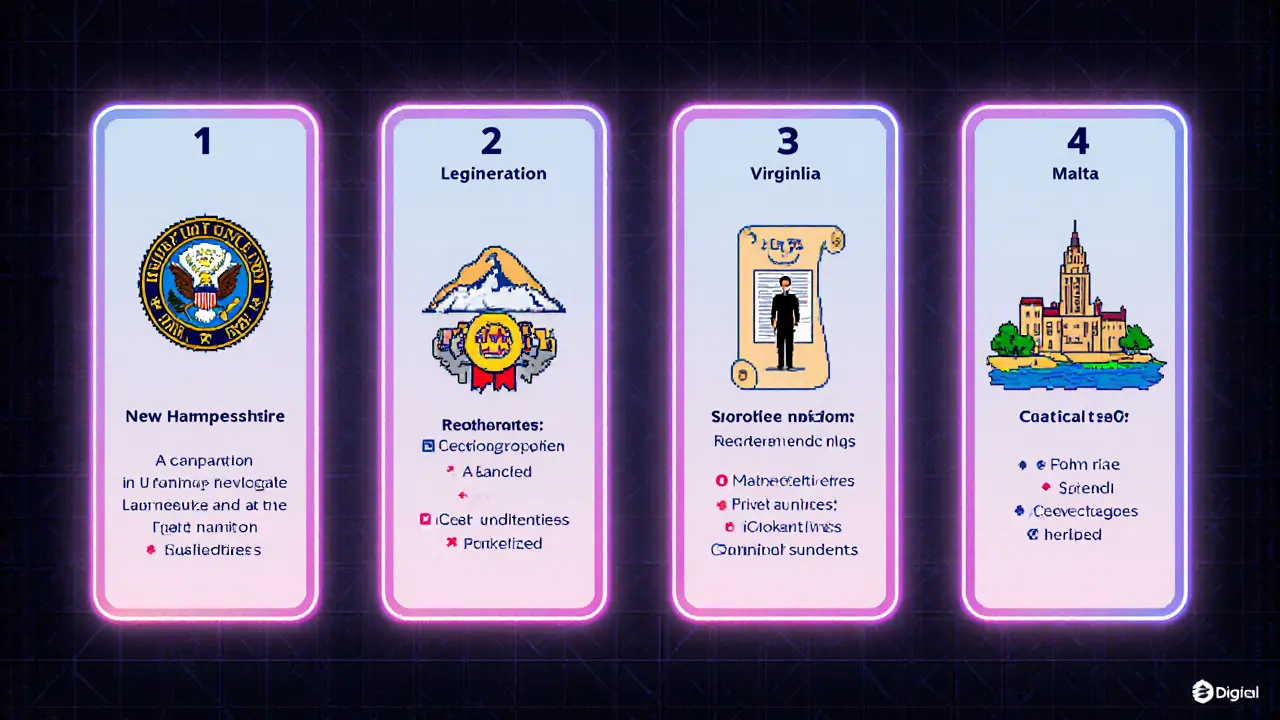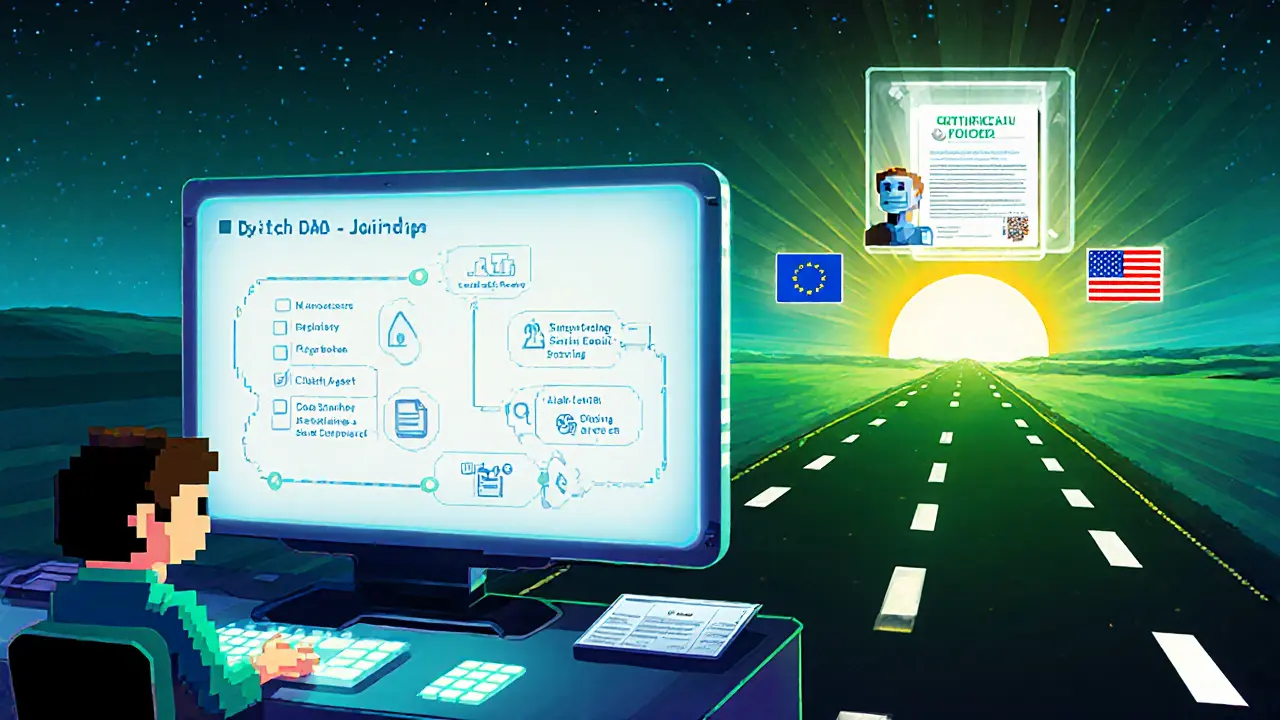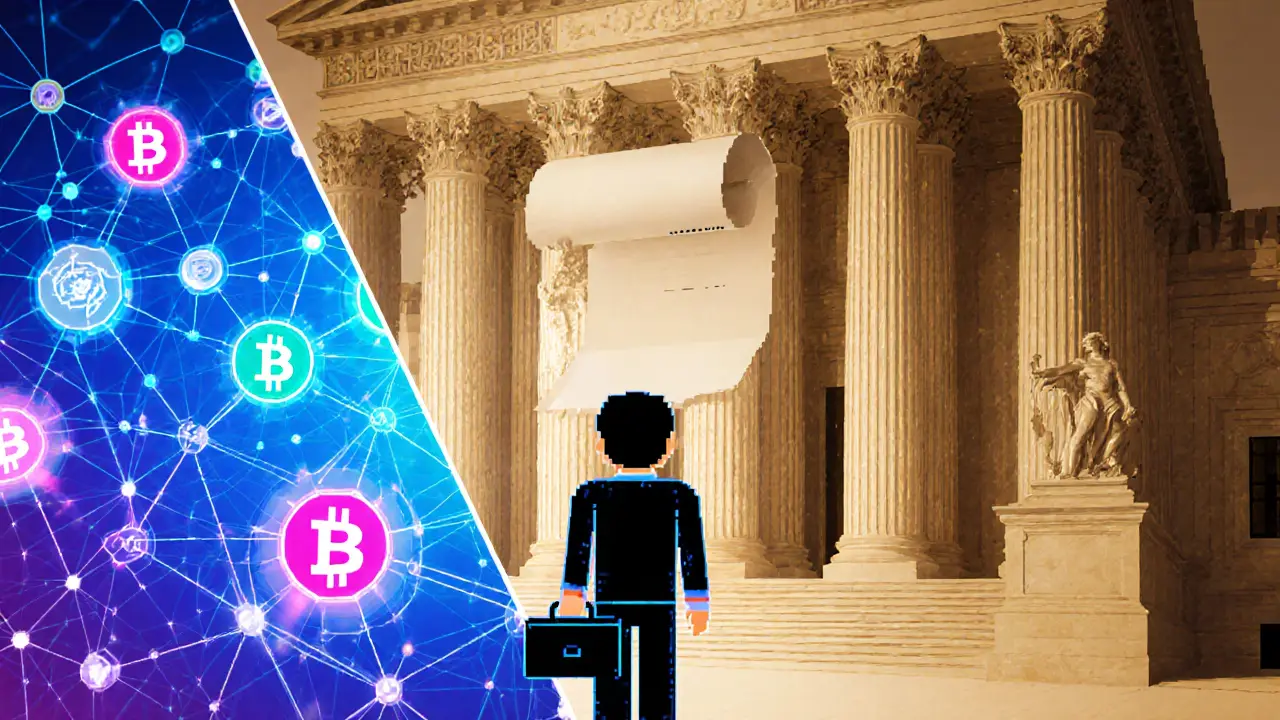DAO Legal Status Checker
Legal Status Summary
| Jurisdiction | Entity Type | Liability Shield | Profit Distribution | Member Minimum | Compliance Burden |
|---|---|---|---|---|---|
| New Hampshire, USA | DAO Entity (statutory) | Yes - limited liability | Allowed | 1 token holder | Annual token-distribution report |
| Wyoming, USA | DUNA (nonprofit) | Yes - limited liability | No - nonprofit only | 100 members | Certification, annual financial statements |
| Virginia, USA (proposed) | LLC (DAO-compatible) | Yes - limited liability | Allowed | 1 member | Standard LLC filing + token-holder disclosures |
| Malta (EU) | Certified DAO (ITAS) | Yes - corporate shield | Allowed | 1 token holder | Physical office, compliance officer, audit |
When you hear the term DAO is a Decentralized Autonomous Organization that runs on blockchain technology and makes decisions through token‑based voting, the first question most people ask is: **Can a DAO own assets, sign contracts, or be sued?** In short, the answer depends on where the DAO lives on paper. Over the past two years, a patchwork of state and international laws has tried to give these leaderless groups a legal personality, but the picture is still uneven. This guide walks you through the most important frameworks, what they mean for liability and taxes, and how you can actually register a DAO today.
Key Takeaways
- The United States now has three major statutes - NewHampshire’s DAO Act, Wyoming’s DUNA, and Virginia’s proposed LLC model - each offering limited‑liability protection but with different member requirements.
- Malta’s ITAS Act provides the most comprehensive EU‑wide recognition, but it demands a physical address and certification by the Malta Digital Innovation Authority.
- Without registration, most DAOs are treated as general partnerships or unincorporated associations, leaving members exposed to personal liability.
- Choosing the right jurisdiction hinges on three factors: profit‑seeking vs. nonprofit purpose, desired level of regulatory compliance, and where most members are located.
- Even after registration, federal regulators (CFTC, SEC) can still target DAOs for securities or commodities violations.
Why Legal Status Matters
Traditional corporations give investors confidence because the entity can own property, enter contracts, and limit personal exposure. A DAO that operates only on smart contracts lacks those defaults. If a DAO fails to deliver a product, who can a counter‑party sue? Who pays the tax bill? The answer is usually “the individuals who hold the governance tokens,” which defeats the whole point of decentralization. Legal recognition solves that gap by giving the DAO a separate legal personality, similar to an LLC or nonprofit.
U.S. State‑Level Approaches
American lawmakers have been quick to act, hoping to attract blockchain startups. Here’s a quick rundown of the three leading models.
- New Hampshire DAO Act is the first comprehensive DAO statute in the U.S., effective July2025. It creates a “DAO entity” that can register with the Secretary of State, obtain a digital ID, and enjoy limited‑liability protection. The act requires at least one “governance token holder” and mandates annual reporting of token distribution.
- Wyoming DUNA is the Decentralized Unincorporated Nonprofit Association statute passed in March2024. DUNAs must have a minimum of 100 members, pursue a nonprofit purpose, and can own assets, sue, and be sued. Profit distribution is prohibited, making it a poor fit for commercial DAOs but attractive for community funds.
- Virginia LLC Model is a proposed amendment that would let DAOs register as limited‑liability companies under the Virginia LLC Act. If enacted, it would allow profit‑sharing DAOs while keeping the familiar LLC liability shield. The bill is still in committee as of October2025.
International Recognition
Outside the United States, Malta stands out.
- Malta’s ITAS Act is the Innovative Technology Arrangements and Services legislation that lets the Malta Digital Innovation Authority certify a DAO as a legal entity. Certification grants the DAO the ability to enter contracts, hold bank accounts, and be taxed under standard corporate rules across the EU. The process requires a registered office, a compliance officer, and annual audits.
- Other EU members are watching Malta’s move, but no nation has yet offered a fully comparable regime.

Core Legal Building Blocks
Regardless of jurisdiction, four technical concepts keep coming up.
- Governance token is a digital asset that confers voting rights and, in many cases, economic participation in the DAO. Laws often define token‑holders as the de‑facto members for liability purposes.
- Smart contract is self‑executing code on a blockchain that enforces the DAO’s rules without human intermediaries. While smart contracts automate decisions, they don’t create legal personality unless attached to a recognized entity.
- The CFTC is the U.S. Commodity Futures Trading Commission, which has begun treating some DAOs as unincorporated associations for commodity‑type assets. Its enforcement actions (e.g., against Ooki DAO) underscore the risk of operating without a legal wrapper.
- Tax authorities (IRS, HMRC, Malta Revenue) treat DAOs differently based on classification - partnership, corporation, or nonprofit - influencing filing frequency and rates.
Comparison of Leading Jurisdictions
| Jurisdiction | Entity Type | Liability Shield | Profit Distribution | Member Minimum | Compliance Burden |
|---|---|---|---|---|---|
| New Hampshire, USA | DAO Entity (statutory) | Yes - limited liability | Allowed | 1 token holder | Annual token‑distribution report |
| Wyoming, USA | DUNA (nonprofit) | Yes - limited liability | No - nonprofit only | 100 members | Certification, annual financial statements |
| Virginia, USA (proposed) | LLC (DAO‑compatible) | Yes - limited liability | Allowed | 1 member | Standard LLC filing + token‑holder disclosures |
| Malta (EU) | Certified DAO (ITAS) | Yes - corporate shield | Allowed | 1 token holder | Physical office, compliance officer, audit |
How to Register a DAO - Step‑by‑Step
- Pick the Right Jurisdiction. Match your business model (profit vs. nonprofit) and member geography to one of the frameworks above.
- Draft a Constitution. Most statutes require a governing document that mentions token‑based voting, quorum rules, and how assets are managed.
- Choose a Legal Agent. Even decentralized setups need a registered address or resident agent. Services exist that specialize in DAO compliance.
- File the Registration Form. Submit the entity‑type specific form (e.g., NH DAO Act filing, Wyoming DUNA certificate, Malta ITAS application) along with the constitution and any required fees.
- Obtain a Digital Identifier. Many states issue a DAO ID that can be embedded in smart contracts for on‑chain verification.
- Compliance Ongoing. Keep token‑holder lists up to date, file annual reports, and be ready for audits if you’re in Malta.
Practical Checklist for DAO Founders
- Confirm the DAO’s purpose (profit, nonprofit, community fund).
- Verify where the majority of token holders reside - this influences tax residency.
- Decide if you need limited‑liability protection or can operate as an informal partnership.
- Prepare a clear governance token model (voting weight, transferability).
- Engage a legal counsel familiar with blockchain law in the chosen jurisdiction.
- Plan for federal regulator interaction (CFTC, SEC) - especially if your tokens are securities‑like.
Future Outlook
Legislation is moving fast. New Hampshire’s DAO registry is slated to go live in early 2026, and Virginia’s bill is expected to pass the House this year. On the EU side, Malta’s certification process is already handling about 30 DAOs, and the European Commission is drafting a cross‑border DAO directive that could harmonise rules across member states. Until a unified global standard appears, most DAOs will continue to choose the jurisdiction that offers the best blend of liability protection, tax clarity, and operational ease.

Frequently Asked Questions
Can an unregistered DAO be sued?
Yes. If a DAO lacks legal personality, courts usually treat the token holders as the de‑facto partners, meaning they can be held personally liable for debts or contractual breaches.
Do I need a physical address to register a DAO?
Most jurisdictions (New Hampshire, Wyoming, Malta) require a registered office or resident agent. Services exist that provide a compliant address without compromising decentralization principles.
What taxes does a DAO owe?
Tax treatment follows the entity classification. A DAO recognized as an LLC files as a partnership or corporation, paying income tax on profits. A nonprofit DUNA files for tax‑exempt status but cannot distribute profits. International DAOs must also consider VAT, GST, and withholding rules in each jurisdiction where they earn revenue.
How does the CFTC view DAOs?
The CFTC has treated some DAOs as unincorporated associations that trade commodity‑type tokens. This means the agency can pursue enforcement actions for fraud, market manipulation, or failure to register as a futures commission merchant.
Is the New Hampshire DAO Act the best choice for profit‑seeking DAOs?
For many profit‑oriented projects, New Hampshire offers the simplest path: a single‑member DAO can register, gain limited liability, and keep token‑holder reporting minimal. However, if you need an EU‑wide passport, Malta’s ITAS may be more advantageous despite higher compliance costs.



Joyce Welu Johnson
June 8, 2025 AT 23:17Wow, this guide really breaks down the maze of DAO regulations. I love how you laid out the differences between New Hampshire and Wyoming – it made my head stop spinning. The part about liability shields felt like a safety net finally being put in place. For anyone nervous about personal risk, this is a beacon of hope. Thanks for making such a complex topic feel approachable!
Fionnbharr Davies
June 13, 2025 AT 00:31The philosophical angle here is fascinating – we’re essentially redefining what a legal entity means. Seeing DAOs getting recognized alongside LLCs shows how law can evolve with technology. It also reminds us that governance, whether on‑chain or off‑chain, needs clear rules. Your step‑by‑step section will be a lifeline for many founders. Keep the insights coming!
Anurag Sinha
June 17, 2025 AT 01:44Everybody keep reading, this is the truth they don’t want you to see. The powers that be are secretly feeding us fragments of the DAO statutes to keep us divided while they tighten their grip on the blockchain. Did you know the CFTC has a hidden clause that lets them claim any DAO token as a commodity, regardless of its purpose? That means any smart contract you deploy could be grabbed by a federal agency tomorrow. And the New Hampshire DAO Act? Just a smokescreen – they’re planting backdoors to trace token‑holder votes. I heard a source that the Malta certification process requires a hidden partnership with a shell company that routes all funds through an offshore bank. The DUNA in Wyoming? A puppet, designed to make you think you’re safe while the state collects your data. Federal regulators are already stitching together a global watchlist of DAO participants, cross‑referencing wallet addresses with passport data. You’ll wake up one day and find your DAO assets frozen because someone in Washington decided they look like a "security". Remember the early DAO hack? That was a coordinated effort, not just a random exploit. Every compliance report you file is another breadcrumb leading to your identity. The whole system is rigged to force decentralization into a centralized oversight model. So before you file that annual token‑distribution report, ask yourself: who’s really watching? The answer isn’t in the FAQs – it’s in the shadows.
Raj Dixit
June 21, 2025 AT 02:57Don't forget that profit‑seeking DAOs still face securities law scrutiny. Choose your jurisdiction wisely.
Lisa Strauss
June 25, 2025 AT 04:11Super excited to see more states embracing DAO structures! This will lower the barrier for community projects. If you need any moral support, I'm here cheering you on.
Enya Van der most
June 29, 2025 AT 05:24Great rundown, especially the Malta section – it’s the most comprehensive I’ve seen. The compliance officer requirement might sound heavy, but it adds real credibility. For anyone eyeing EU markets, this is a solid path. Keep pushing the envelope!
Adeoye Emmanuel
July 3, 2025 AT 06:37Wow, Anurag, you’ve really opened the rabbit hole on hidden agendas. I’ve always suspected there’s more to the CFTC’s involvement than meets the eye, and your details add weight to that suspicion. It’s scary to think every compliance form could be a data point for a larger surveillance net. While the legal recognitions help on paper, they also create new avenues for authority to step in. Your warning is a needed wake‑up call for all DAO builders.
Iva Djukić
July 7, 2025 AT 07:51The taxonomy you present aligns well with the emerging framework of decentralized corporate governance. By distinguishing between token‑holder voting mechanisms and traditional shareholder structures, you clarify the intersection of on‑chain consensus and off‑chain legal obligations. Moreover, the analysis of liability shields across jurisdictions underscores the importance of selecting a domicile that matches the DAO’s operational risk profile. The nuanced discussion of the CFTC’s commodity classification adds a layer of regulatory foresight that many overlook. Your checklist, especially the emphasis on a clear governance token model, is indispensable for founders navigating multi‑jurisdictional compliance. I also appreciate the forward‑looking commentary on the EU’s prospective DAO directive, which could harmonize disparate national regimes. Overall, the piece serves as both a practical guide and a strategic manifesto for the decentralized future.
WILMAR MURIEL
July 11, 2025 AT 09:04Reading through this, I’m struck by how much the legal landscape has accelerated. When I first heard about DAOs, there was no clear path to liability protection. Now we have entire statutes that treat token holders as members for legal purposes. It’s a massive shift that could unlock mainstream adoption. The step‑by‑step registration guide is especially useful for creators who aren’t law experts. I’m looking forward to the upcoming New Hampshire registry – could be a game changer.
carol williams
July 15, 2025 AT 10:17The balance between decentralization and regulatory compliance is delicate. Your table nicely visualizes the trade‑offs each jurisdiction presents. I especially like the note on Malta’s need for a physical office – it’s a reminder that true decentralization still grapples with real‑world constraints. Nice work!
Maggie Ruland
July 19, 2025 AT 11:31Oh great, another legal maze.
jit salcedo
July 23, 2025 AT 12:44So many layers, it’s like an onion of bureaucracy. Each jurisdiction adds its own flavor of red tape, making the whole thing both fascinating and exhausting. The idea of a DAO certified by a digital authority feels futuristic, yet we’re still stuck filling out PDFs. Still, the potential for real‑world legitimacy is there. Let’s hope the regulators keep up.
Ally Woods
July 27, 2025 AT 13:57Looks solid, but the compliance burden could scare off small projects. Maybe simplify the reporting?
Kristen Rws
July 31, 2025 AT 15:11Super helpful guide! I did notice a tiny typo in the Malta section, but overall great job. Keep the updates coming.
Andrew McDonald
August 4, 2025 AT 16:24The analysis is thorough, though I’d prefer a deeper dive into tokenomics implications. Still, a commendable effort.
Deepak Chauhan
August 8, 2025 AT 17:37From a national perspective, our policies must adapt to these novel entities. The EU’s harmonisation attempts are a step forward, but we need sovereign solutions too. Let’s watch the legislative drafts closely.
Henry Mitchell IV
August 12, 2025 AT 18:51Interesting insights! 😊